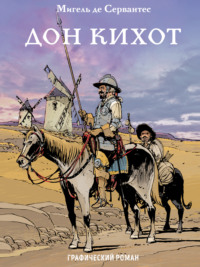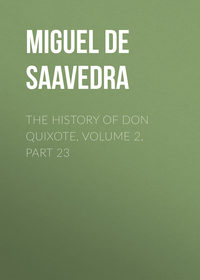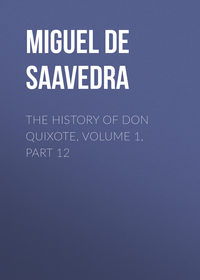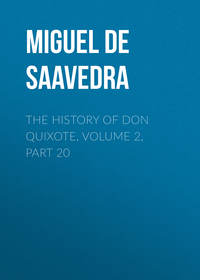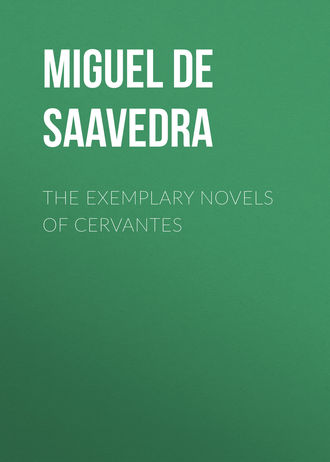 полная версия
полная версияThe Exemplary Novels of Cervantes
The night was one of the long and weary ones of December, when the cold and the fatigues of the day should naturally have disposed the two travellers to sleep; but they had not that effect on the first of the pair, who not long after midnight began to sigh and moan as if his heart would break. His lamentations awoke the occupant of the other bed, who distinctly overheard the following soliloquy, though uttered in a faint and tremulous voice, broken by sighs and sobs.
"Wretch that I am! Whither is the irresistible force of my destiny hurrying me? What a path is mine; and what issue can I hope for out of the labyrinth in which I am entangled? O my youth and inexperience! Honour disregarded! Love ungratefully repaid! Regard for honoured parents and kindred trampled under foot! Woe is me a thousand times to have thus given the reins to my inclinations! O false words which I have too trustingly responded to by deeds! But of whom do I complain? Did I not wilfully betray myself? Did not my own hands wield the knife that cut down my reputation, and destroyed the trust which my parents reposed in my rectitude? O perjured Marco Antonio! Is it possible that your honeyed words concealed so much of the gall of unkindness and disdain? Where art thou, ingrate? Whither hast thou fled, unthankful man? Answer her who calls upon thee! Wait for her who pursues thee; sustain me, for I droop; pay me what thou owest me; succour me since thou art in so many ways bound to me!"
Here the sorrowing stranger relapsed into silence, broken only by sobs. The other, who had been listening attentively, inferred from what he had heard that the speaker was a woman. The curiosity he had before felt was now excited to the highest degree: he was several times on the point of approaching the lady's bed; and he would have done so at last, but just then he heard her open the door, call to the landlord, and bid him saddle the nag, for she wanted to go. It was a pretty long time before she could make the landlord hear her; and finally, all the answer she could obtain was a recommendation to go to sleep again, for there was more than half the night yet to come, and it was so dark that it would be a very rash thing to venture upon the road. Upon this she said no more, but shut the door, and went back to bed, sighing dismally.
The other stranger now thought it would be well to address her, and offer her his aid in any way that might be serviceable, as a means of inducing her to say who she was, and relate her piteous story. "Assuredly, señor gentleman," said he, "I should think myself destitute of natural feeling – nay, that I had a heart of stone and a bosom of brass – if your sighs and the words you have uttered did not move me to sympathy. If the compassion I feel for you, and the earnest desire I have conceived to risk my life for your relief – if your misfortunes admit of any – may give me some claim upon your courtesy, I entreat you to manifest it in declaring to me the cause of your grief without reserve."
"If that grief had not deprived me of understanding," said the person addressed, "I ought to have remembered that I was not alone in this room, and have bridled my tongue and suppressed my sighs; but to punish myself for my imprudent forgetfulness, I will do what you ask; for it may be that the pangs it will cost me to relate the bitter story of my misfortunes will end at once my life and my woes. But first you must promise me solemnly, that whatever I may reveal, you will not quit your bed nor come to mine, nor ask more of me than I choose to disclose; for if you do, the very moment I hear you move I will run myself through with my sword, which lies ready to my hand."
The cavalier, who would have promised anything to obtain the information he so much desired, vowed that he would not depart a jot from the conditions so courteously imposed. "On that assurance, then," said the lady, "I will do what I have never done before, and relate to you the history of my life. Hearken then.
"You must know, señor, that although I entered this inn, as they have doubtless told you, in the dress of a man, I am an unhappy maiden, or at least I was one not eight days ago, and ceased to be so, because I had the folly to believe the delusive words of a perjured man. My name is Teodosia; my birth-place is one of the chief towns of the province of Andalusia, the name of which I suppress, because it does not import you so much to know it as me to conceal it. My parents, who are noble and wealthy, had a son and a daughter; the one for their joy and honour, the other for the reverse. They sent my brother to study at Salamanca, and me they kept at home, where they brought me up with all the scrupulous care becoming their own virtue and nobility; whilst on my part I always rendered them the most cheerful obedience, and punctually conformed to all their wishes, until my unhappy fate set before my eyes the son of a neighbour of ours, wealthier than my parents, and no less noble than they. The first time I saw him, I felt nothing more than the pleasure one feels at making an agreeable acquaintance; and this I might well feel, for his person, air, manners, disposition, and understanding were the admiration of all who knew him. But why dwell on the praises of my enemy, or make so long a preface to the confession of my infatuation and my ruin? Let me say at once that he saw me repeatedly from a window opposite to mine; whence, as it seemed to me, he shot forth his soul towards me from his eyes, whilst mine beheld him with a pleasure very different from that which I had experienced at our first interview, and one which constrained me to believe that everything I read in his face was the pure truth.
"Seeing each other in this way led to conversation; he declared his passion, and mine responded to it, with no misgiving of his sincerity, for his suit was urged with promises, oaths, tears, sighs, and every accompaniment that could make me believe in the reality of his devoted attachment. Utterly inexperienced as I was, every word of his was a cannon shot that breached the fortress of my honour; every tear was a fire in which my virtue was consumed; every sigh was a rushing wind that fanned the destructive flame. In fine, upon his promise to marry me in spite of his parents, who had another wife in view for him, I forgot all my maidenly reserve, and without knowing how, put myself into his power, having no other witness of my folly than a page belonging to Marco Antonio – for that is the name of the destroyer of my peace – who two days afterwards disappeared from the neighbourhood, without any person, not even his parents, having the least idea whither he was gone. In what condition I was left, imagine if you can; it is beyond my power to describe it.
"I tore my hair as if it was to blame for my fault, and punished my face as thinking it the primary occasion of my ruin; I cursed my fate, and my own precipitation; I shed an infinity of tears, and was almost choked by them and by my sighs; I complained mutely to heaven, and pondered a thousand expedients to see if there was any which might afford me help or remedy, and that which I finally resolved on was to dress myself in male apparel, and go in quest of this perfidious Æneas, this cruel and perjured Bireno, this defrauder of my honest affections and my legitimate and well-founded hopes. Having once formed this resolution, I lost no time in putting it in execution. I put on a travelling suit belonging to my brother, saddled one of my father's horses with my own hand, and left home one very dark night, intending to go to Salamanca, whither it was conjectured that Marco Antonio might have gone; for he too is a student, and an intimate friend of my brother's. I did not omit to take at the same time a quantity of gold sufficient for all contingencies upon my journey. What most distresses me is the thought that my parents will send in pursuit of me, and that I shall be discovered by means of my dress and the horse; and even had I not this to fear, I must dread my brother's resentment; for he is in Salamanca, and should he discover me, I need not say how much my life would be in peril. Even should he listen to my excuses, the least scruple of his honour would outweigh them all.
"Happen what may, my fixed resolve is to seek out my heartless husband, who cannot deny that he is my husband without belying the pledge which he left in my possession – a diamond ring, with this legend: 'Marco Antonio is the husband of Teodosia.' If I find him, I will know from him what he discovered in me that prompted him so soon to leave me; and I will make him fulfil his plighted troth, or I will prove as prompt to vengeance as I was easy in suffering myself to be aggrieved, and will take his life; for the noble blood that runs in my veins is not to be insulted with impunity. This, señor cavalier, is the true and sad history you desired to hear, and which you will accept as a sufficient apology for the words and sighs that awoke you. What I would beseech of you is, that though you may not be able to remedy my misfortune, at least you may advise me how to escape the dangers that beset me, evade being caught, and accomplish what I so much desire and need."
The cavalier said not a syllable in reply, and remained so long silent that Teodosia supposed he was asleep and had not heard a word she had been saying. To satisfy herself of this, she said, "Are you asleep, señor? No wonder if you are; for a mournful tale poured into an unimpassioned ear is more likely to induce drowsiness than pity."
"I am not asleep," replied the cavalier; "on the contrary, I am so thoroughly awake, and feel so much for your calamity, that I know not if your own anguish exceeds mine. For this reason I will not only give you the advice you ask, but my personal aid to the utmost of my powers; for though the manner in which you have told your tale proves that you are gifted with no ordinary intelligence, and therefore that you have been your own betrayer, and owe your sorrow to a perverted will rather than to the seductions of Marco Antonio, nevertheless I would fain see your excuse in your youth and your inexperience of the wily arts of men. Compose yourself, señora, and sleep if you can during the short remainder of the night. When daylight comes we will consult together, and see what means may be devised for helping you out of your affliction."
Teodosia thanked him warmly, and tried to keep still for a while in order that the cavalier might sleep; but he could not close an eye; on the contrary he began to toss himself about in the bed, and to heave such deep sighs that Teodosia was constrained to ask him what was the matter? was he suffering in any way, and could she do anything for his relief?
"Though you are yourself the cause of my distress, señora," he replied, "you are not the person who can relieve it, for if you were I should not feel it."
Teodosia could not understand the drift of this perplexed reply; she suspected, however, that he was under the influence of some amorous passion, and even that she herself might be the object of it; for it might well be that the fact of his being alone with one he knew to be a woman, at that dead hour of the night, and in the same bed-room, should have awakened in him some bad thoughts. Alarmed at the idea, she hastily put on her clothes without noise, buckled on her sword and dagger, and sat down on the bed to wait for daylight, which did not long delay to appear through the many openings there were in the sides of the room, as usual in inn-chambers. The cavalier on his part, had made ready exactly as Teodosia had done; and he no sooner perceived the first rays of light, than he started up from his bed, saying, "Get up, señora Teodosia, and let us be gone; for I will accompany you on your journey, and never quit your side until I see Marco Antonio become your lawful husband, or until he or I shall be a dead man;" and so saying, he opened the windows and the doors of the room.
Teodosia had longed for daylight that she might see what manner of man he was with whom she had been conversing all night; but when she beheld him, she would have been glad that it had never dawned, but that her eyes had remained in perpetual darkness, for the cavalier who stood before her was her brother! At sight of him she was stupefied with emotion, her face was deadly pale, and she could not utter a word. At last, rallying her spirits, she drew her dagger, and presenting the handle to her brother, fell at his feet, and gasped out, "Take it, dear señor and brother, punish the fault I have committed, and satisfy your resentment, for my offence deserves no mercy, and I do not desire that my repentance should be accepted as an atonement. The only thing I entreat is that you will deprive me of life, but not of my honour; for though I have placed it in manifest danger by absenting myself from the house of my parents, yet its semblance may be preserved before the world if my death be secret."
Her brother regarded her fixedly, and although her wantonness excited him to vengeance, he could not withstand this affecting appeal. With a placable countenance he raised her from the ground, and consoled her as well as he could, telling her, among other things, that as he knew of no punishment adequate to the magnitude of her folly, he would suspend the consideration of that matter for the present; and as he thought that fortune had not yet made all remedy impossible, he thought it bettor to seek one than at once to take vengeance on her for her levity. These words restored Teodosia to life; the colour returned to her cheeks, and her despair gave way to revived hope. Don Rafael (that was the brother's name) would speak no more on the subject, but bade her change her name from Teodosia to Teodoro, and decided that they should both proceed at once to Salamanca in quest of Marco Antonio, though he hardly expected to find him there; for as they were intimate friends, they would have met had he been at the university, unless indeed Marco Antonio might have shunned him from a consciousness of the wrong he had done him. The new Teodoro acquiesced in everything proposed by her brother; and the innkeeper coming in, they ordered breakfast, intending to depart immediately.
Before all was ready another traveller arrived. This was a gentleman who was known to Don Rafael and Teodoro, and the latter, to avoid being seen by him, remained in the chamber. Don Rafael, having embraced the newcomer, asked him what news he brought. His friend replied that he had just come from the port of Santa Maria, where he had left four galleys bound for Naples, and that he had seen Marco Antonio Adorno, the son of Don Leonardo Adorno, on board one of them. This intelligence rejoiced Don Rafael, to whom it appeared that since he had so unexpectedly learned what it was of such importance for him to know, he might regard this an omen of his future success. He asked his friend, who knew his father well, to exchange the hired mule he rode for his father's nag, giving him to understand, not that he was coming from Salamanca, but that he was going thither, and that he was unwilling to take so good an animal on so long a journey. The other obligingly consented, and promised to deliver the nag to its owner. Don Rafael and he breakfasted together, and Teodoro alone; and finally the friend pursued his journey to Cazallo, where he had an estate, whilst Don Rafael excused himself from accompanying him by saying that he had to return that day to Seville.
As soon as the friend was gone, and the reckoning paid, Don Rafael and Teodoro mounted and bade adieu to the people of the inn, leaving them all in admiration of the comeliness of the pair. Don Rafael told his sister what news he had received of Marco Antonio, and that he proposed they should make all haste to reach Barcelona; for vessels on their way to or fro between Italy and Spain usually put in at that port; and if Marco Antonio's ship had not yet arrived there, they would wait for it, and be sure of seeing him. His sister said he should do as he thought best, for his will was hers. Don Rafael then told the muleteer who accompanied him to have patience, for he intended to go to Barcelona, but would pay him accordingly. The muleteer, who was one of the merriest fellows of his trade, and who knew Don Rafael's liberality, declared that he was willing to go with him to the end of the world.
Don Rafael asked his sister what money she had. She told him she had not counted it; all she knew was that she had put her hand seven or eight times into her father's strong box, and had taken it out full of gold crowns. From this Don Rafael calculated that she might have something about five hundred crowns, which, with two hundred of his own, and a gold chain he wore, seemed to him no bad provision for the journey; the more so, as he felt confident of meeting Marco Antonio in Barcelona. They pursued their journey I rapidly without accident or impediment until they arrived within two leagues of a town called Igualada, which is nine leagues from Barcelona, and there they learned that a cavalier who was going as ambassador to Rome, was waiting at Barcelona for the galleys, which had not yet arrived. Greatly cheered by this news, they pushed on until they came to the verge of a small wood, from which they saw a man running, and looking back over his shoulder with every appearance of terror. "What is the matter with you, good man?" said Don Rafael, going up to him. "What has happened to you, that you seem so frightened and run so fast?"
"Have I not good cause to be frightened and to run fast," said the man, "since I have escaped by a miracle from a gang of robbers in that wood?"
"Malediction! Lord save us!" exclaimed the muleteer. "Robbers at this hour! By my halidom, they'll leave us as bare as we were born."
"Don't make yourself uneasy, brother," replied the man from the wood, "for the robbers have by this time gone away, after leaving more than thirty passengers stripped to their shirts and tied to trees, with the exception of one only, whom they have left to unbind the rest as soon as they should have passed a little hill they pointed out to him."
"If that be so," said Calvete, the muleteer, "we may proceed without fear, for where the robbers have made an attack, they do not show themselves again for some days. I say this with confidence, as a man who has been twice in their hands, and knows all their ways."
This fact being confirmed by the stranger, Don Rafael resolved to go on. They entered the wood, and had not advanced far, when they came upon the persons who had been robbed, and who were more than forty in number. The man who had been left free, had unbound some of them; but his work was not yet complete, and several of them were still tied to the trees. They presented a strange spectacle, some of them stripped naked, others dressed in the tattered garments of the robbers; some weeping over their disaster, some laughing at the strange figure the others made in their robber's costume; one dolorously reciting the list of the things he had lost, another declaring that the loss of a box of Agnus Dei he was bringing home from Rome afflicted him more than all besides. In short, the whole wood resounded with the moans and lamentations of the despoiled wretches. The brother and sister beheld them with deep compassion, and heartily thanked heaven for their own narrow escape from so great a peril. But what affected Teodoro more than anything else was the sight of a lad apparently about fifteen, tied to a tree, with no covering on him but a shirt and a pair of linen drawers, but with a face of such beauty that none could refrain from gazing on it. Teodoro dismounted and unbound him, a favour which he acknowledged in very courteous terms; and Teodoro, to make it the greater, begged Calvete to lend the gentle youth his cloak, until he could buy him another at the first town they came to. Calvete complied, and Teodoro threw the cloak over his shoulders, asking him in Don Rafael's presence to what part of the country he belonged, whence he was coming, and whither he was going. The youth replied that he was from Andalusia, and he named as his birthplace a town which was but two leagues distant from that of the brother and sister. He said he was on his way from Seville to Italy, to seek his fortune in arms like many another Spaniard; but that he had had the misfortune to fall in with a gang of thieves, who had taken from him a considerable sum of money and clothes, which he could not replace for three hundred crowns. Nevertheless he intended to pursue his journey, for he did not come of a race which was used to let the ardour of its zeal evaporate at the first check.
The manner in which the youth expressed himself, the fact that he was from their own neighbourhood, and above all, the letter of recommendation he carried in his face, inspired the brother and sister with a desire to befriend him as much as they could. After they had distributed some money among such of the rest as seemed in most need of it, especially among monks and priests, of whom there were eight, they made this youth mount Calvete's mule, and went on without more delay to Igualada. There they were informed that the galleys had arrived the day before at Barcelona, whence they would sail in two days, unless the insecurity of the roadstead compelled them to make an earlier departure. On account of this news, they rose next morning before the sun, although they had not slept all night in consequence of a circumstance which had occurred at supper, and which had more surprised and interested the brother and sister than they were themselves aware. As they sat at table, and the youth with them whom they had taken under their protection, Teodoro fixed her eyes intently on his face, and scrutinising his features somewhat curiously, perceived that his ears were bored. From this and from a certain bashfulness that appeared in his looks, she suspected that the supposed youth was a woman, and she longed for supper to be over that she might verify her suspicion. Meanwhile Don Rafael asked him whose son he was, for he knew all the principal people in the town he had named as his birth place. The youth said he was the son of Don Enrique de Cardenas. Don Rafael replied that he was well acquainted with Don Enrique, and knew for certain that he had no son; but that if he had given that answer because he did not choose to make known his family, it was of no consequence, and he should not be questioned again on that subject.
"It is true," said the youth, "that Don Enrique has no children, but his brother Don Sancho has."
"He has no son either," replied Don Rafael, "but an only daughter, who, by the bye, they say is one of the handsomest damsels in Andalusia; but this I know only by report; for though I have been often in her town I have never seen her."
"It is quite true, as you say, señor, that Don Sancho has only a daughter, but not one so handsome as fame reports; and if I said that I was the son of Don Enrique it was only to give myself some importance in your eyes; for in fact, I am only the son of Don Sancho's steward, who has been many years in his service, and I was born in his house. Having displeased my father, I carried off a good sum of money from him, and resolved to go to Italy, as I have told you, and follow the career of arms, by which men even of obscure birth have been known to make themselves illustrious."
Teodoro, who listened attentively to all this conversation, was more and more confirmed in her suspicion, both by the manner and the substance of what the youth said. After the cloth was removed, and while Don Rafael was preparing for bed, she made known to him her surmise, and then, with his permission, took the youth aside, and, going out with him upon a balcony which looked on the street, addressed him thus: —
"Don Francisco," for that was the name he had given himself, "I would fain have done you so much service that you could not help granting me anything that I should ask of you; but the short time we have known you has not permitted this. Hereafter perhaps you may know how far I deserve that you should comply with my desires; but if you do not choose to satisfy that which I am now about to express, I will not the less continue to be your faithful servant. Furthermore, before I prefer my present request, I would impress upon you that although my age does exceed yours, I have more experience of the world than is usual at my years, as you will admit when I tell you that it has led me to suspect that you are not a man, as your garb imports, but a woman, and one as well-born as your beauty proclaims, and perhaps as unfortunate as your disguise implies, for such transformations are never made willingly, or except under the pressure of some painful necessity. If what I suspect is the case, tell me so, and I swear to you on the faith of a cavalier to aid and serve you in every way I can. That you are a woman you cannot make me doubt, for the holes in your ears make that fact very clear. It was thoughtless of you not to close them with a little flesh-coloured wax, for somebody else as inquisitive as myself, and not so fit to be trusted with a secret, might discover by means of them what you have so ill concealed. Believe me, you need not hesitate to tell me who you are, in full reliance on my inviolable secrecy."


